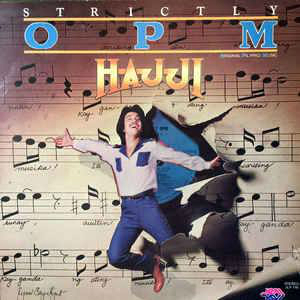Is Original Pilipino Music (OPM) still vital in 2017? It’s been almost 40 years since the golden age of Pinoy music peaked in the late 1970s and times have changed in the local music scene.
So get ready as we rewind the soundtrack of our lives and reminisce with three familiar Original Pilipino Music artists now considered legends by their peers and loyal fans: singer, actress, comedian Pilita Corrales and singer, actor Hajji Alejandro.
 Pilita Corrales
Pilita Corrales
Known by many for her signature song “Kapantay Ang Langit,” Pilita Corrales, Asia’s Queen of Songs, still has what it takes to be a star after almost six decades in the local showbiz industry.
An award-winning singer and comedian, Corrales started her career in Australia where she was among the country’s pioneers of the growing television years. She also had a string of memorable concerts and shows, like Your Evening with Pilita Corrales, which aired from 1965 to 1972 and is considered one of the benchmarks in Philippine television.
During the early 1960s, Corrales only recorded Spanish songs but then went on to record popular English, Tagalog and Cebuano songs. Corrales has performed with world-acclaimed international singers, like Sammy Davis, Jr., Matt Monroe and Frank Sinatra. She is also known as the lone Filipina singer to perform during the 1966 concert of The Beatles in Manila.
 “I used to say that Australia was my second home after the Philippines. That is where I started my career in show business and that is where I made my first albums. I used to appear on Australian television three times a week in a show called A Memory Tonight. But what I think the people found unique about me is that I was one of the few performers who could sing in Spanish, English, Visayan and Tagalog,” said Corrales.
“I used to say that Australia was my second home after the Philippines. That is where I started my career in show business and that is where I made my first albums. I used to appear on Australian television three times a week in a show called A Memory Tonight. But what I think the people found unique about me is that I was one of the few performers who could sing in Spanish, English, Visayan and Tagalog,” said Corrales.
Corrales got into singing as a means to support her family when her father died while she was in finishing school in Spain. She was able to send her five siblings through school with her singing. She is also the first Filipino to win in an international music festival when she was given the Best Performer Award at the first Tokyo Music Festival in 1972.
Corrales takes pride in her children, Jackie Lou and Ramon Christopher. She also thoroughly enjoys being a grandmother.
“For me, the work of a mother is never ending. A grandmother is just like being a mother and you should always be there to help them in every problem that they have, what they need and what they don’t need. So I don’t differentiate between grandmother and mother but it is wonderful,” said Corrales.
Corrales’ philosophy in life is to just wake up in the morning and first of all thank God that you have a brand new day ahead of you.
“I don’t make a problem a problem. Whatever comes within the day I will accept it but my attitude is everything will be fine,” said Corrales.
 Hajji Alejandro
Hajji Alejandro
During the Martial Law years of the 1970s, the local band scene was about the only entertainment that the youth could look forward to amidst a government-controlled media. Show bands dominated the local music scene and one of the most popular bands during that time was the Circus Band.
After a few years together, members of the Circus Band eventually parted ways and started their respective solo careers. One of them, Angelito Toledo Alejandro, better known as Hajji Alejandro, was signed up by noted composer Willy Cruz to sing for the newly established record label Gem Records.
The original Kilabot ng mga Kolegiala launched a successful career in the local music scene with songs like “Panakip Butas,” “May Minamahal,” “Nakapagtataka” and “Tag-araw, Tag-ulan.” Alejandro also became an actor by joining the cast of Batibot which was directed by Behn Cervantes. He was also part of the rock opera/ballet Tales of the Manuvu in 1977 and the musicals The Wiz and The Fantastiks. His last musical was in 2011 when he played the role of Zoser in Aida.
“Ariel Ureta was my compadre way back then and he was the one who coined that moniker, Kilabot ng Kolegiala, when I was a guest in his TV show, Ariel After Six. Maybe it was because my first concerts were done in the colleges and universities back then. So ang nagging following ko noon were students,” said Alejandro.
His song, “Kay Ganda ng Ating Musika,” composed by Ryan Cayabyab, won the grand prize at the first Metro Manila Popular Music Festival in 1977. In 1978, Alejando received the Best Singer Award at the first International Seoul Song Festival in South Korea.
 “When Ryan Cayabyab approached me to sing “Kay Ganda ng Ating Musika” for the first Metro Manila Popular Music Festival, I already had a couple of hit songs under my belt—“Panakip Butas” and “Tag-araw, Tag-ulan”—which were adaptations of “The Worst That Can Happen” by the 5th Dimension and “Charade” by the Bee Gees.
“When Ryan Cayabyab approached me to sing “Kay Ganda ng Ating Musika” for the first Metro Manila Popular Music Festival, I already had a couple of hit songs under my belt—“Panakip Butas” and “Tag-araw, Tag-ulan”—which were adaptations of “The Worst That Can Happen” by the 5th Dimension and “Charade” by the Bee Gees.
“We chose these songs to be included in my first album which were composed mainly of adaptations. This later on led to a second album which is half adaptations and half original compositions.
“The third album that we made was titled Strictly OPM, a term that was coined by Danny Javier. That was the first time that the word OPM (Original Pilipino Music) came out. Disc Jockeys (DJs) were always asking us, ‘What is OPM?’ And we told them it means Original Pilipino Music. So duon sa album na iyon lumabas ang ‘Kay Ganda ng Ating Musika’ after winning at the first Metro Music Festival,” said Alejandro.
What did Alejandro do to be an original Pinoy musician and what were his influences?
“Ang dami kong influences when I was growing up. There was Elvis Presley, Nat King Cole, Frank Sinatra and Johnny Mathis. In the 1970s puro Motown artists, like Stevie Wonder. Si Stevie Wonder idol ko talaga. Even when I was performing with the Circus Band, ang uso kasi noon was to sound like the record. But that all changed when I became a recording artist kasi I cannot try to sound like anybody else. So that was when my real style, my real voice came out and it was a product of all these influences,” said Alejandro.
For Alejandro what did it take to really last in the local music industry? “First of all, you have to know in your heart that you have something to offer, something to add to the table that wasn’t there before. Parang all or nothing iyan and you can only express it through the songs that you love to sing,” said Alejandro.
By Jose K. Lirios








